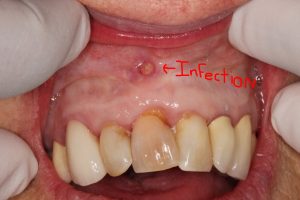Over the past 19 years in Private Practice here in Seattle I have had the opportunity to see many New patients come in to our office reporting lingering pain after having had Root Canal Treatment done. Some of the Root Canals were performed years ago, while some were performed more recently.
First lets discuss why teeth need root canals in the first place. Teeth are basically nerves covered with a hard enamel outer shell. If the nerve becomes damaged, it may require removal with a Root Canal Procedure. Here is a list of things that can cause the nerve in a tooth to die:
- Parafunctional Activity – Teeth Grinding, Teeth Clenching
- Periodontal Disease – Bacterial associated Destruction of the Gum and Bone around the Teeth
- Dental Decay – Cavities/Loss of Tooth Structure from Acid
- Extent of Dental Work – The more dental work a Tooth has, the more likely the nerve will die with repeated procedures being done to the Tooth.
- Trauma – Teeth that undergo Trauma are likely to have the Nerve die.
- Fractures – Can cause the Nerve to Die
Now that we have reviewed the Reasons why a Tooth might need a Root Canal, lets Discuss the Symptoms that might develop which may indicate that a Root Canal is necessary. If you develop symptoms such as Lingering hot/cold sensitivity, spontaneous pain which is un-provoked, throbbing pain, swelling in the gum and or face, taste of bad odor or pus in the gum or mouth, darkening of a Tooth, you may need to have Root Canal Treatment performed.
Now that we have discussed why teeth need Root Canals and the Symptoms you will experience indicating the need for Root Canal Treatment, lets discuss the importance of having the Root Canal treatment done as soon as symptoms develop.
As the Nerve starts to die inside the tooth, the sooner the nerve is removed the greater the chance that complete resolution and healing can take place. Upon removal of the Nerve, the canals inside the roots are thoroughly dis-infected to kill all bacteria and all tissue is removed so that the canals are bacteria free. If the Nerve in the tooth is not removed soon after symptoms develop, the Nerve will become infected and the infection will spread out of the tooth and into the jaw bone and face.
It is at this point that the Infection is no longer just inside the tooth, but it has spread outside the tooth, and completing the Root Canal alone will not guarantee complete resolution of the Infection. In this case where the Infection has spread outside the tooth, the Infection is still alive and growing in the bone, and this is why patients are still having pain after a Root Canal Procedure has been done. Let me Summarize that:
IF THE TOOTH STILL HURTS AFTER HAVING ROOT CANAL TREATMENT, IT IS QUITE LIKELY THAT THE INFECTION IS STILL ALIVE AND GROWING INSIDE THE JAWBONE AND THE ROOT CANAL PROCEDURE WILL NOT FIX THE TOOTH ALONE.
The procedure for removing the infection inside the bone after the Root Canal has been completed is Endodontic Surgery. The infection must be surgically exposed and the infection removed, then the defect/hole in the bone must be filled in with graft bone, followed by a membrane/cover and allowed to heal.

Infection in Jaw after Root Canal Treatment 20 years ago.
This 70 year old patient came to our office complaining of a foul odor in her mouth that had never gone away. Although she had the Root Canal done over 20 years ago, the infection had never gone away. We Re-treated her Root Canal and also Surgically Removed the Infection in the Jawbone.
She is now infection free for the first time in 20 years.
So my advice to all patients with symptoms from above, have the Root Canal done right away so that Infection does not progress into the Jawbone, which may require Surgery
Please email me with any questions and I will be happy to assist you you in any way I can.
Thank You,
Robert Taylor DDS FICOI










